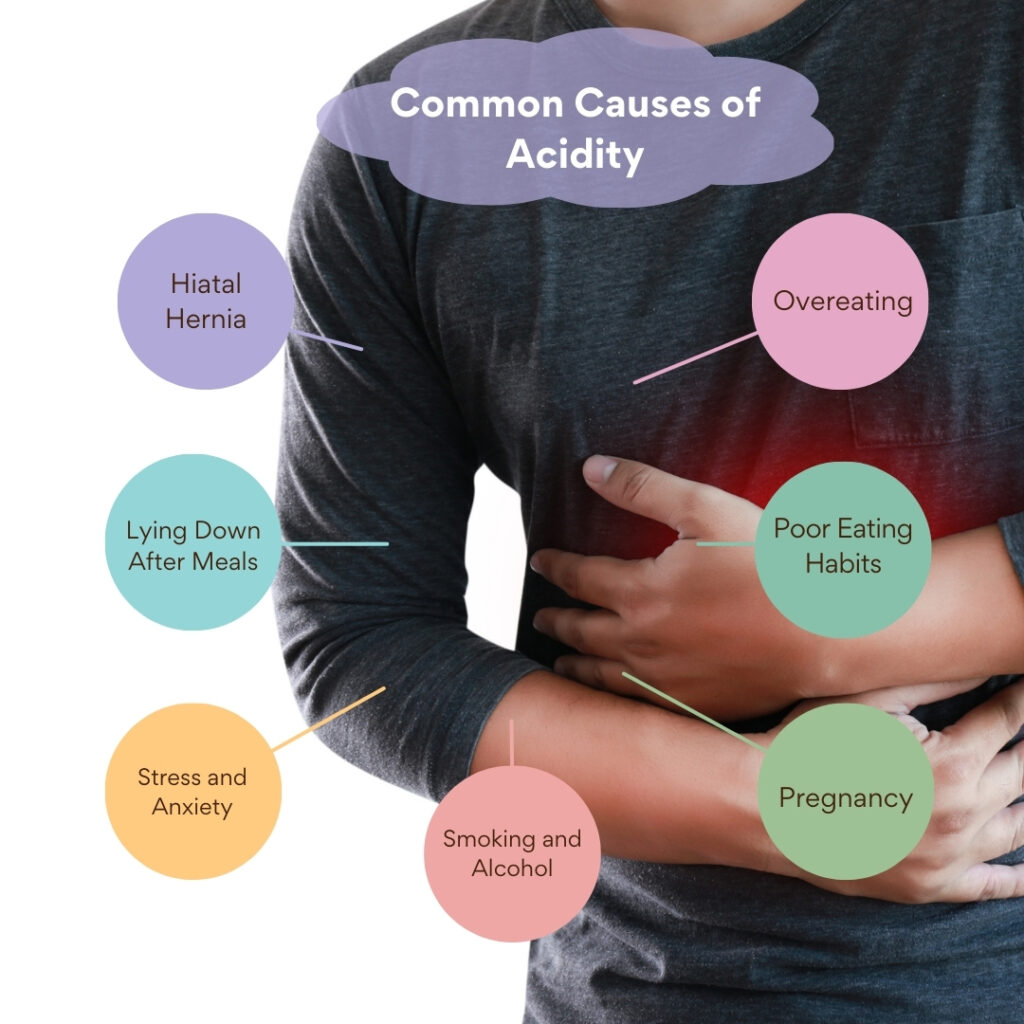
Blog Highlight : Acidity is one common ailment we have all faced in our lives. In this blog, we have listed 15 home remedies that will give you immediate relief from acidity.
Acidity is one common ailment we have all faced at some point in our lives, after a satisfying meal. It is also known as acid reflux, and the medical term for it is Gastroesophageal Reflux Disease (GERD). It occurs when our stomach acids flow back into our throats, which causes a burning sensation in our chest, upper abdomen, or throat.
And although there are many over-the-counter medications available for this condition, going to the pharmacy may not be convenient for everyone. This is where home remedies can step in and give you instant relief.
This is why in this blog, we have listed the top 15 home remedies that will give you immediate relief from acidity.
So, read on to find out more.
Top 8 Common Symptoms of Acidity
Some common symptoms of acidity can vary in severity from person to person, and can include the following:

1. Heartburn
One of the most common symptoms of acidity is a burning sensation or discomfort in the chest, often referred to as heartburn.
2. Regurgitation
Regurgitation involves the sensation of stomach acid or food coming back into the throat or mouth.
3. Indigestion
Acidity can cause indigestion, leading to symptoms such as bloating, and feeling overly full.
4. Difficulty Swallowing
Some individuals with acidity may experience difficulty swallowing, known as dysphagia.
5. Chest pain
Acidity can sometimes cause chest pain which can be mistaken for a heart attack.
6. Nausea
Acidity can cause feelings of nausea, and in some cases, individuals may vomit to relieve the discomfort.
7. Chronic cough
Stomach acid that reaches the throat can trigger a chronic cough. This occurs when the acid irritates the sensitive lining of the esophagus.
8. Sore throat
Acid reflux can lead to irritation of the vocal cords and throat, resulting in hoarseness or a persistent sore throat.
Common Causes of Acidity
Several factors can contribute to acidity in individuals. Thus, it is important to understand the common causes that can help people make certain lifestyle changes to prevent or manage acidity.
Below are some of the common causes of acidity

1. Hiatal Hernia
A hiatal hernia occurs when the upper part of the stomach pushes through the diaphragm into the chest cavity, which can result in acid reflux.
2. Overeating
This is one of the common causes of acidity. Consuming large meals or overeating can put increased pressure on the stomach which promotes the backward flow of stomach acid into the esophagus.
3. Lying Down After Meals
Lying down or going to bed too soon after eating allows gravity to work against the natural flow of stomach acid. This makes it easier for acid to reflux back into the esophagus.
4. Poor eating habits
Most people don’t know this but eating too quickly, not chewing food thoroughly, and eating late at night can contribute to acidity.
5. Certain Foods and Beverages
Acidic and spicy foods, citrus fruits, tomatoes, chocolate, coffee, tea, and carbonated beverages can trigger acidity
6. Smoking and Alcohol
Both smoking and alcohol intake can result in a weak lower esophageal sphincter, which allows stomach acid to flow back into the esophagus.
7. Pregnancy
Hormonal changes and the growing uterus during pregnancy can put pressure on the stomach and lower esophageal sphincter, leading to increased acid reflux.
8. Stress and Anxiety
Stress and anxiety can affect the digestive system and may lead to increased acid production.
Is Acidity a Serious Problem?
Acidity is generally not considered a serious problem when it occurs occasionally and is managed effectively. Moreover, many people experience acidity from time to time, especially after consuming certain foods or due to certain lifestyle factors. However, the severity and frequency of symptoms can vary from person to person.
Occasional acidity is common and can be managed with lifestyle and dietary changes. However, persistent acidity should not be ignored, and often indicate certain underlying diseases.
Moreover, if acidity is not managed it can lead to complications such as esophagitis (inflammation of the esophagus), Barrett’s esophagus (changes in the lining of the esophagus that may increase the risk of esophageal cancer), and narrowing of the esophagus.
Top 8 tips to control acidity
Controlling acidity involves adopting lifestyle changes and making choices that help prevent the occurrence or reduce the severity of acid reflux symptoms. Below are some strategies you can implement to control acidity.
1. Dietary Awareness
Identify and avoid trigger foods like spicy, citrus, and chocolate. Moreover, embrace a balanced diet rich in fruits, vegetables, and lean proteins. Consult a dietitian for a customized diet plan to reduce the chances of acidity.
2. Portion Management
Opt for smaller, more frequent meals to prevent overeating, reducing pressure on the stomach and minimizing the risk of acid reflux.
3. Mindful Meal Timing
Allow a gap of at least two to three hours between your last meal and bedtime. This aids digestion and prevents acid reflux during sleep.
4. Hydration Habits
Stay hydrated throughout the day to help neutralize stomach acid, but avoid excessive fluid intake during meals to prevent overfilling the stomach.
5. Elevate While Sleeping
Elevate the head of your bed or use a wedge pillow to encourage gravity to keep stomach acid from flowing into the esophagus during sleep.
6. Weight Management
Maintain a healthy weight through regular exercise and a balanced diet to reduce abdominal pressure and lower the risk of acidity.
7. Lifestyle Changes
Quit smoking, choose loose-fitting clothing, limit alcohol intake, and practice stress-reducing techniques to support overall digestive health.
8. Consult a Professional
If acidity persists or worsens, seek guidance from a certified healthcare professional for personalized evaluation and potential use of medications.
Top 15 Home Remedies That Will Give You Immediate Relief From Acidity
Below are some of the top home remedies you can easily prepare at home for immediate relief from acidity

1. Water Therapy
One of the best home remedies for acidity is drinking water. Water helps neutralize stomach acid and provides immediate relief. Sip on small amounts of water throughout the day, especially between meals. This not only helps in soothing acidity but also aids in digestion.
2. Basil Leaves
Basil leaves, known for their anti-inflammatory properties, can be a potent remedy for acidity. Chew a few basil leaves to get immediate relief from acidity at home. Alternatively, you can make a basil tea by boiling a few leaves in water and sipping it slowly.
3. Fennel Seeds
Fennel seeds have been used for centuries to alleviate digestive issues, including acidity. Chewing on a teaspoon of fennel seeds after meals can help neutralize stomach acid and promote better digestion.
4. Cold Milk
Milk contains calcium, which can neutralize stomach acid and provide relief from acidity. Sip on a glass of cold milk to soothe the burning sensation. For those who are lactose intolerant, almond milk can be a suitable alternative.
5. Ginger
Ginger is renowned for its digestive properties and can be an excellent remedy for acidity. Chew on a small piece of fresh ginger or make ginger tea by boiling grated ginger in water. Ginger helps in reducing inflammation and promoting better digestion.
6. Aloe Vera Juice
Aloe vera is known for its healing properties, and consuming aloe vera juice can help in soothing the digestive tract. Drink a small amount of aloe vera juice before meals to prevent acidity. Ensure that the juice is free from additives and preservatives.
7. Apple Cider Vinegar
Although apple cider vinegar is acidic in nature, it can actually help in balancing the pH levels in the stomach. Mix a teaspoon of apple cider vinegar in a glass of water and drink it before meals.
This can prevent acidity by promoting proper digestion. Most people also find drinking ACV to be an instant home remedy for acidity.
8. Coconut Water
Coconut water is not only refreshing but also alkaline, making it an excellent remedy for acidity. Drinking coconut water can help neutralize stomach acid and provide immediate relief from acidity.
9. Baking Soda
Baking soda, or sodium bicarbonate, is a natural antacid that can quickly neutralize stomach acid. Mix half a teaspoon of baking soda in a glass of water and drink it for instant relief. However, it’s essential to use this remedy sparingly, as its excessive consumption can lead to side effects.
10. Cumin Seeds
Cumin seeds aid in digestion and can be an effective remedy for acidity. Roast cumin seeds and grind them into a powder. Mix half a teaspoon of this powder with water and consume it after meals to prevent acidity.
11.Banana
Bananas are known for their natural antacid properties, making them a great choice for those dealing with acidity. Eat a ripe banana to neutralize stomach acid and provide relief from acidity symptoms.
12. Clove
Clove has been used traditionally to ease digestive issues, and it can be beneficial in treating acidity. Chew on a clove after meals or make clove tea by steeping a few cloves in hot water
13. Buttermilk
Buttermilk is often consumed after meals and is also a quick home remedy for acidity in Indian households. It is rich in lactic acid, which can help neutralize stomach acid and soothe the digestive system. Add a pinch of black pepper and cumin powder to buttermilk to enhance its effectiveness.
14. Watermelon juice
Watermelon is a hydrating fruit with a high water content that can help neutralize stomach acid. Freshly extracted watermelon juice is a refreshing and natural way to stay hydrated while providing relief from acidity.
15. Mint leaves
Mint leaves have been used traditionally for their digestive properties. They can help relax the muscles of the gastrointestinal tract, reducing the chances of stomach acid flowing back into the esophagus.
You can place mint leaves in a bowl overnight, and consume the water after straining it. You can also make a mint leaf tea by boiling mint leaves in water.
What foods trigger acidity?
Certain foods and beverages are known to trigger acidity or aggravate acid reflux symptoms. Below is a list of common food items that may contribute to acid reflux.
- Citrus fruits
- Tomatoes and tomato-based products
- Spicy foods
- Chocolate
- Coffee and tea (caffeinated)
- Carbonated drinks
- Fried and fatty foods
- Onions and garlic
- Peppermint
- Alcohol
- Processed foods
- Mint
- Highly acidic foods
Moreover, most people will have certain tolerances for the food items listed above. Thus, some people might be sensitive to these foods, while others may not have any issues. Thus, it’s advisable to keep track of your symptoms and consider consulting a nutritionist or dietitian for personalized advice.
Final thoughts
Acidity can be a bothersome condition, but with these 15 home remedies, you will get immediate relief from acidity without resorting to medication. Incorporate these natural remedies into your routine, and consider making lifestyle changes for a holistic approach to managing acidity.
However, it’s crucial to consult with a healthcare professional if you experience persistent or severe acidity symptoms to rule out any underlying health issues.
Change your diet now with tailored diet help from experienced dietitian and nutritionist Silky Mahajan, and say goodbye to acidity.
FAQs
Green tea is generally considered less acidic than coffee and is often better tolerated, but its impact on acidity can vary among individuals.
Yes, smoking can weaken the lower esophageal sphincter (LES) and contribute to acidity by allowing stomach acid to flow back into the esophagus.
Yes, drinking water can help neutralize stomach acid and provide relief from acidity symptoms.
Yes, beer, like other alcoholic beverages, can relax the LES and increase stomach acid production, potentially causing acidity.
Ginger is known for its digestive properties and can be beneficial in reducing acidity.
No, bananas are generally considered a non-acidic and soothing fruit and can actually help alleviate acidity.
Yes, mangoes can be acidic, and for some individuals, consuming them may trigger acidity.
Yes, acidity can cause chest pain, often referred to as heartburn. However, it’s crucial to rule out more severe conditions, and persistent chest pain should be evaluated by a healthcare professional.
Cold milk can help neutralize stomach acid and provide relief from acidity symptoms. However, hot or warm milk can trigger acidity symptoms in some people.
Yes, papaya contains enzymes like papain that aid digestion and can help reduce acidity.
Lemon, when consumed in moderation, may have an alkalizing effect and is considered beneficial for some people with acidity.
Yes, coconut water is alkaline and can help neutralize stomach acid, providing relief from acidity.
Yes, Eno is an antacid, that can provide quick relief from acidity symptoms. However, it is advisable to use it under appropriate guidance.
Yes, coffee is acidic and can relax the LES, contributing to acidity.
Yes, buttermilk is often considered a natural remedy for acidity due to its cooling and alkalizing properties.
Yes, stress can affect the digestive system and may contribute to increased stomach acid production, leading to acidity.
Yes, in some cases, severe acidity may cause respiratory symptoms such as breathlessness. Persistent breathlessness should be evaluated by a healthcare professional.






